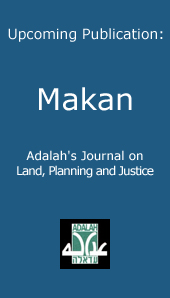 Israeli Army Asks Supreme Court to Re-Examine its Decision Banning the Use of Palestinian Civilians as Human Shields before an Expanded Panel of the Court Israeli Army Asks Supreme Court to Re-Examine its Decision Banning the Use of Palestinian Civilians as Human Shields before an Expanded Panel of the Court |
|
|
|
|
|
|
|
Articles: Gender and Group Rights |
|
|
|
On Gender, Nationalism and Universalism: The Legal Issue of Representation for Women in Israel |
|
Abeer Baker, Advocate, Adalah |
 |
|
Twofold Discrimination: The Status of the Arab Woman as an Individual and as a Member of a National Collective Struggling for its Rights |
|
Samar Khamis, Advocate and Adalah Board Member |
 |
|
When the Right to Family Life Clashes with the Right to a United Family |
|
Sawsan Zaher, Advocate, Adalah |
|
|
|
International Day Against Violence Against Women |
|
|
 On the Characteristics of Patriarchal Societies, Gender Inequality and Wife Abuse: The Case of Palestinian Society On the Characteristics of Patriarchal Societies, Gender Inequality and Wife Abuse: The Case of Palestinian Society
Prof. Muhammad Haj-Yahia, Hebrew University and Adalah Board Member |
|
|
|
Land, Planning and Justice |
|
Despite ILA’s Insistence on Spraying Crops Cultivated by Bedouin in Unrecognized Villages in the Naqab, Supreme Court Extends Injunction Prohibiting these Operations |
 |
|
Following Adalah’s Intervention: ILA Will Include all Arab Villages in the North on List of Villages Eligible for Large Discounts on Leasing Land |
|
|
|
Education Rights |
|
Haifa District Court: Misgav Regional Council Must Resume School Transport and Pay Educational Fees for Children from Arab Bedouin Villages in the North |
 |
|
Petition to Supreme Court: Education Ministry Must Provide Preschool Education for Arab Bedouin Children in Unrecognized Village in the Naqab |
|
|
|
Criminal Justice |
|
Magistrate Court Imposes House Arrest on Six Arab Bedouin Detainees Following Protests in Unrecognized Village in the Naqab against Home Demolition Orders |
|
|
|
|
|
 Adalah’s Newsletter is a monthly publication issued in Arabic, Hebrew and English. It highlights Adalah’s main activities, provides analysis of human rights issues, and links to new reports. Suggestions, articles and commentaries from our readers are welcome. View previous volumes Adalah’s Newsletter is a monthly publication issued in Arabic, Hebrew and English. It highlights Adalah’s main activities, provides analysis of human rights issues, and links to new reports. Suggestions, articles and commentaries from our readers are welcome. View previous volumes |
|
|
|
|
|
|
Opening Remarks |
|
Generally, the literature on multiculturalism analyzes the relationship between group rights and women’s rights in one of two ways. The first approach argues that cultural rights for minorities and immigrant groups must be recognized, despite the fact, as its advocates argue, that these groups do not always respect women’s rights. According to this reasoning, “we” cannot impose “our” Western, liberal values on these groups. The second approach argues that there is no need to recognize cultural rights because these groups do not accept “our” universal, liberal values. The two approaches relate to minority cultures as hermetic, closed, and unified, without internal power struggles for the group’s social values. There is no culture today without internal contradictions and internal resistance groups. Therefore, these two approaches are mistaken in defining the culture of the Other. The reason that group rights must be recognized (similar to the feminist approach) is in order to eradicate one group’s domination over the other. This reason must also apply to internal relations within a minority cultural group. Thus, recognition of group rights must also include the rights of persons belonging to internal sub-groups without discrimination based on religious beliefs, gender, age or sexual orientation. |
|
|
 |
|
|
|